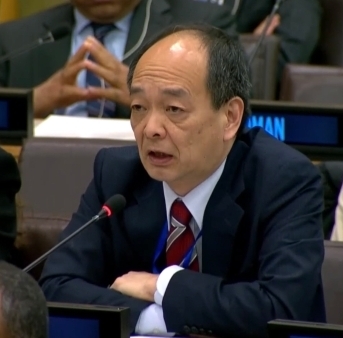Statement by H.E. Ambassador YAMANAKA Osamu, Deputy Permanent Representative of Japan to the United Nations, Agenda Item 136: Review of Efficiency – Review of the changes to the budgetary cycle, Main Part of the 77th Session of the Fifth Committee of the United Nations General Assembly
2022/11/28

(Check against delivery)
Mr. Chair,
At the outset, I would like to thank Ms. Catherine Pollard, Under-Secretary-General for Management Strategy, Policy and Compliance for presenting the Secretary-General’s report on the review of the changes to the budgetary cycle, as well as Mr. Abdallah Bachar Bong, Chair of the ACABQ, for introducing the Advisory Committee's report.
Mr. Chair,
The trial period has demonstrated that the Organization could more effectively respond to changing needs and new circumstances with a programme budget that was based more on current reality and accurate assumptions. The COVID-19 pandemic has served as an opportunity to test the strength of the shorter cycle. Thus, Japan strongly supports the Secretary-General’s initiative to change from a biennial to an annual budget cycle.
These years have been a new endeavor for all of us. While we see advantages and accomplishments, an annual programme budget is, of course, not perfect. There is always room for improvement, as mentioned in the Secretary-General’s report and highlighted in the ACABQ report. Taking advantage of this review process, we need to make collective efforts to improve the process and content of the budget in order to make the Organization stronger, more effective and more efficient.
For example, we could improve the link between proposed resources and results by refining the components and presentation of deliverables. In addition, the annual budget provides an opportunity to further enhance predictability by minimizing so-called “Add-Ons.”
We may also want to address the increased workload for the Secretariat, ACABQ, and Member States due to an annual budget by seeking opportunities to make more use of technology like Umoja, merge some reports where applicable, and increase informal conversations that would allow us to better understand each other and spare too many written interactions.
Mr. Chair,
Finally, my delegation remains committed to engaging positively and constructively in the negotiations ahead in order to achieve a consensual outcome on this important agenda item under the Chair’s able leadership.
I thank you, Mr. Chair.
At the outset, I would like to thank Ms. Catherine Pollard, Under-Secretary-General for Management Strategy, Policy and Compliance for presenting the Secretary-General’s report on the review of the changes to the budgetary cycle, as well as Mr. Abdallah Bachar Bong, Chair of the ACABQ, for introducing the Advisory Committee's report.
Mr. Chair,
The trial period has demonstrated that the Organization could more effectively respond to changing needs and new circumstances with a programme budget that was based more on current reality and accurate assumptions. The COVID-19 pandemic has served as an opportunity to test the strength of the shorter cycle. Thus, Japan strongly supports the Secretary-General’s initiative to change from a biennial to an annual budget cycle.
These years have been a new endeavor for all of us. While we see advantages and accomplishments, an annual programme budget is, of course, not perfect. There is always room for improvement, as mentioned in the Secretary-General’s report and highlighted in the ACABQ report. Taking advantage of this review process, we need to make collective efforts to improve the process and content of the budget in order to make the Organization stronger, more effective and more efficient.
For example, we could improve the link between proposed resources and results by refining the components and presentation of deliverables. In addition, the annual budget provides an opportunity to further enhance predictability by minimizing so-called “Add-Ons.”
We may also want to address the increased workload for the Secretariat, ACABQ, and Member States due to an annual budget by seeking opportunities to make more use of technology like Umoja, merge some reports where applicable, and increase informal conversations that would allow us to better understand each other and spare too many written interactions.
Mr. Chair,
Finally, my delegation remains committed to engaging positively and constructively in the negotiations ahead in order to achieve a consensual outcome on this important agenda item under the Chair’s able leadership.
I thank you, Mr. Chair.
